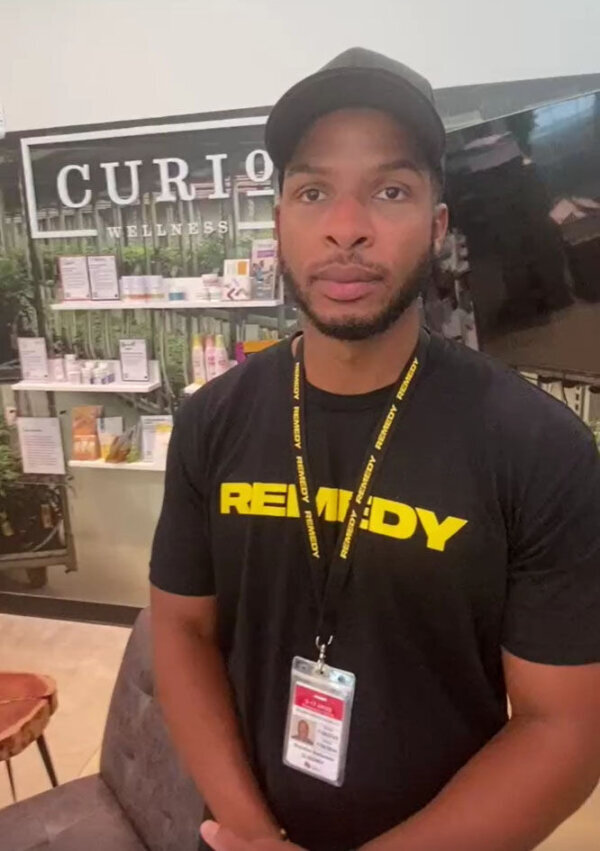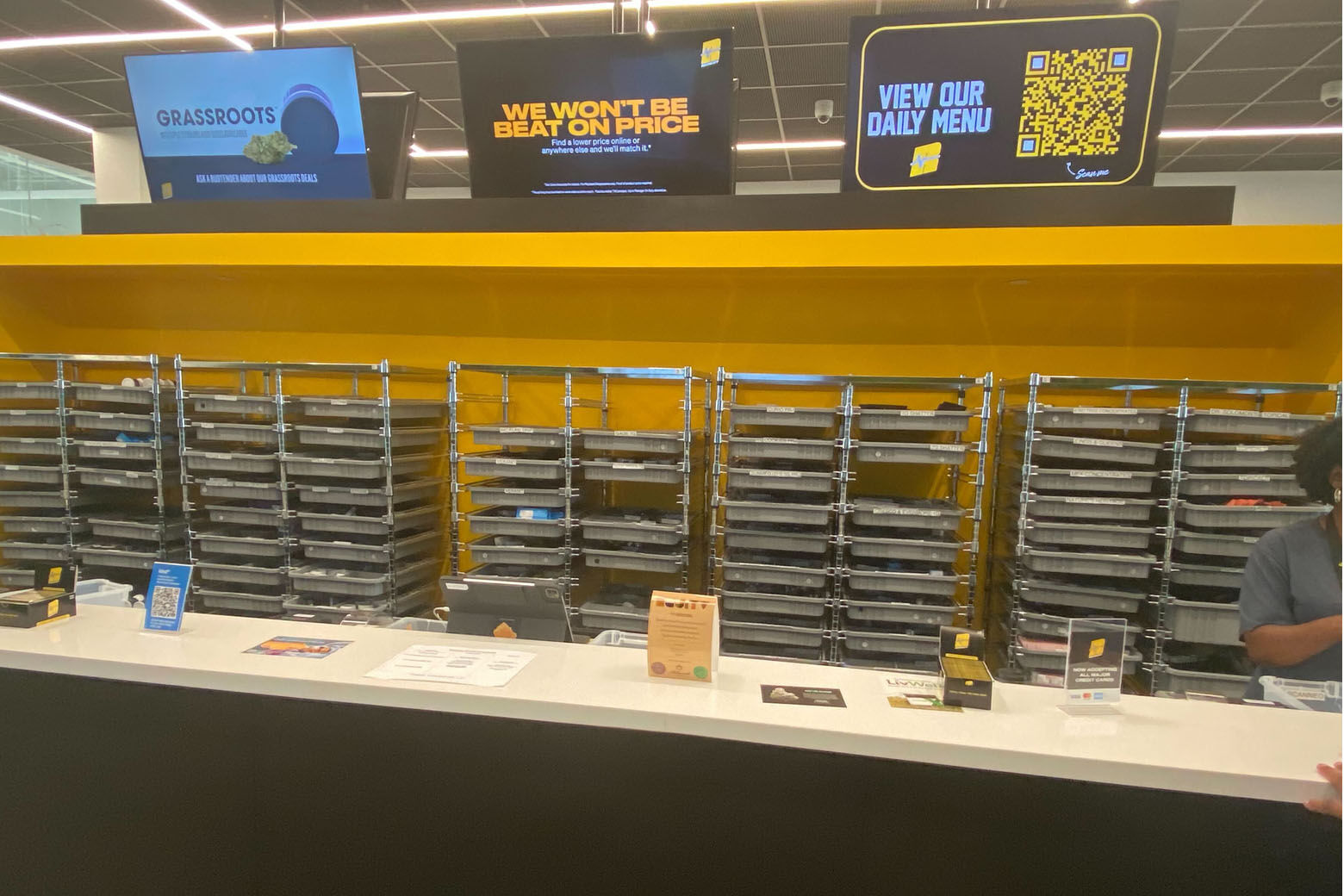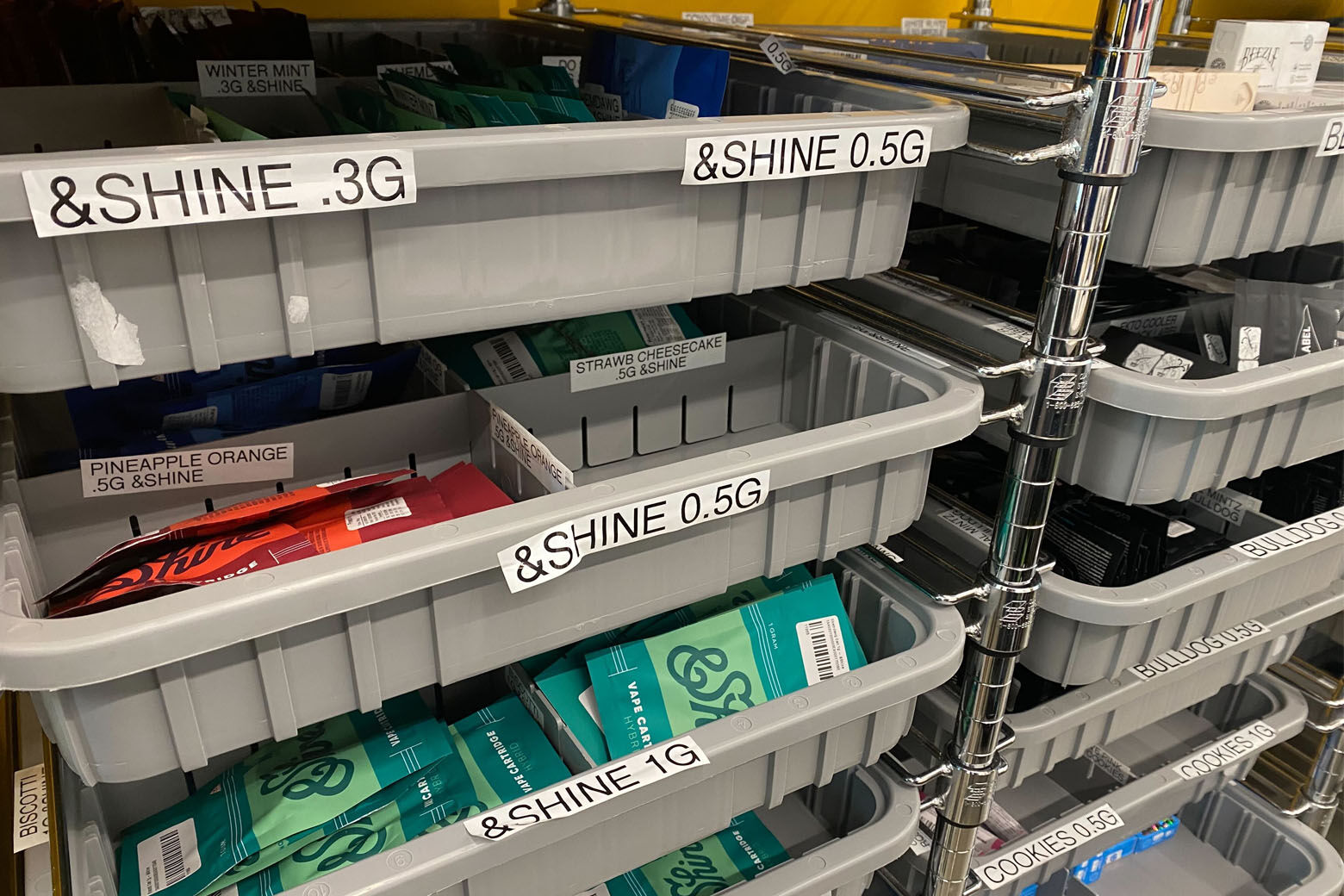On July 1, Maryland joins D.C. and Virginia in legalizing recreational marijuana — but unlike those other jurisdictions, a regulated and functional retail market for marijuana will also open up.
“It’s going to be extremely busy,” said Brandon Barksdale, the co-CEO of Remedy, a marijuana dispensary with locations in Columbia, Maryland, and Baltimore County. “We’re bracing for a huge influx of traffic.”
D.C., Maryland and Virginia all have medical marijuana systems already up and running, and Virginia and D.C. have also already legalized small amounts of marijuana for personal use.
But have you tried to legally buy marijuana — or cannabis — without a medical marijuana card in those places?
In Virginia, you can’t. In D.C., it’s more murky, with the unlicensed “gifting” of cannabis products used to get around D.C.’s inability to have a licensed retail market.
Maryland’s move this weekend will make it the first jurisdiction in the region to introduce a legal retail market for adults 21 and over. WTOP breaks down what you can expect — and what the change means both for Maryland and the region.
How big will Maryland’s market be?

Maryland’s 160,000 medical marijuana patients generated sales in the range of $500 million last year, said Andrew Garrison, who is the chief of the office of policy and government affairs with the Maryland Cannabis Administration, the agency that oversees and regulates the sale and use of cannabis in the state.
“There’s about four million Marylanders who are over 21,” Garrison noted. Adding the people in surrounding jurisdictions who are interested in accessing Maryland’s new retail sales and “we think this is going to be a really robust market,” he said.
“Estimates for the first year of sales range from $400 million to $600 million,” Garrison said. That’s because while there might be more recreational users, they’re likely to buy smaller amounts of recreational products compared to medical users. A legislative estimate suggested recreational marijuana sales could total about $1.5 billion in the coming years.
Barksdale said he believes recreational buyers could spend between $80 and $100 per trip to their local dispensary, depending on how much they buy, what they buy and how potent it is.
Plans are well underway for the first day of sales at Remedy’s stores, where food and other vendors are expected to be on site, along with music and a festive atmosphere. But he expects every dispensary to have long lines early on, since the only other state in the region that allows retail sales is New Jersey.
That means some of the 94 dispensaries that operate in Maryland from Cumberland to West Ocean City will be easily accessible to those who live in neighboring states, such as Virginia, Pennsylvania, West Virginia and Delaware (which is likely to have retail sales starting in the fall of 2024).
“I do think we’ll get cross-border traffic,” Barksdale said.
Dispensary owners see a wide base of support.
An overwhelming two-thirds of the state’s voters approved the referendum legalizing cannabis last year. And Barksdale said the medical patients who order from Remedy represent a wide cross-section of the state, both men and women of all races ranging in age anywhere from 21 to 70.
“That’s starting to change … the understanding and the acceptance of this particular commodity in the world,” Barksdale said. “I think people are starting to, slowly but surely, try little things.”
Edibles, such as gummies and other snacks that have tetrahydrocannabinol — or THC — baked in, have helped, he said.
“The popularity of edibles is helping people kind of shy away from ‘This has to be something that you smoke,'” he said. “Everyone loves chocolate, everyone loves gummies, and to be able to take part in the experience in a form that you’re more comfortable with has also lightened that tone a little bit.”
Down the line, Barksdale predicts that even someone who may have voted against the referendum in 2022 may end up exploring cannabis products at some point.
“Whether they shout that from the mountaintops or whether it’s their little dark secret, I think we’re still seeing people kind of jump into the realm of cannabis and trying it out,” said Barksdale.
A retail experience you’re probably not used to
This video is no longer available.
If your perception of marijuana products hasn’t changed much over the years, these new laws are likely to do that. Sketchy sellers, mystery products and all-cash transactions are the exact opposite of what’s happening here.
“Dispensaries are going to be required to check IDs,” explained Garrison, with the Maryland Cannabis Administration. You have to be 21-years-old to go inside, and if you’re not of age, it’s not going to be like getting past a bouncer with a good fake ID — a computer will verify you’re legitimate.
“They also have to secure the premises,” Garrison said. “So a lot of dispensaries, you walk in and there’s sort of a lobby, pre-service area, and then you get past that to a more secure facility.”
Barksdale described it as if you’re waiting for your name to be called at the DMV or for your table to be ready at a restaurant.
The more secure area is where you’ll actually be in the same room with whatever you intend to buy, with most of what’s available to purchase behind counters. In the medicinal marijuana era, the people working behind the counters were called “patient advisers.” Going forward, Barksdale said they’ll also be known as “budtenders.”

“They’ll be able to help people explore the menu, answer questions, provide guidance, and hopefully provide an expedited experience,” said Barksdale.
Inside Remedy there are arcade games and other activities that will help someone bide their time, and for those who reach a certain loyalty level, a VIP room where customers will be able to expect to be doted on, complete with a separate entrance for even faster convenience.
Safety and security doesn’t just end inside the building though. Maryland will have some of the strictest oversight of the actual cannabis product being sold at every one of its dispensaries.
“We have a single supply chain throughout the entire process, really, until the point of sale,” Garrison said. “The plants that are being grown in the state, there’s not a medical or adult use plant, just a cannabis plant that’s regulated.
“So one thing we really want to highlight is that these are safe products, because they’re being tested,” added Garrison, who said every batch is tested ahead of time. “We know they’re safe. We know they’re free of heavy metals, and they’ve went through a safe process.”

What’s legal and what isn’t?
These rules come straight from the Maryland Cannabis Administration’s list of frequently asked questions: You can “possess up to 1.5 ounces of cannabis flower, up to 12 grams of concentrated cannabis; or a total amount of cannabis products that does not exceed 750 mg of THC. This is known as the ‘personal use amount.'”
You can use it at home, or in private settings, though product that’s used through smoking or vaping might be subject to further restrictions based on the rules of a particular venue. You cannot consume it in public.
Likewise, “you don’t want to mail to your friend in another state, you don’t want to bring it across state lines, you don’t want to sell it to your friend who is underage,” warned Garrison. And if your job requires a federal security clearance, marijuana is still illegal at the federal level, so you could lose that job even if it’s legal at the state level.
In addition, none of the retail venues will allow you to consume any of the products on site.
“Consumption lounges,” which would offer a venue to use cannabis products — the same way you are able to consume alcohol at a bar — might be legal sometime later in 2024. But right now, the Maryland Cannabis Administration has not been authorized to come up with rules and regulations for such venues.
There’s a belief that could change in the next legislative session, but for now, everything you buy will be considered “to go.”
What about medicinal marijuana?
Other states that have legalized recreational marijuana have seen medicinal usage decline, but things could be different in Maryland.
“We’ve worked really hard to ensure protections for an access for the medical patients,” Garrison said. That means ordering dispensaries to provide special accommodations and services to the medical patients.
“So they either have to set aside time that their dispensary is only serving our medical patients, or they have to have a dedicated service line, sort of like a fast track for those medical patients, to make sure that those folks who have been accessing cannabis products through their medical card are still able to do so,” he said.
Medical marijuana cards are also good for six years, and so those who are enrolled in the program won’t be kicked off anytime soon.
“We do anticipate a lot of folks who are currently in the program staying in the program for some of those benefits for their kind of use and relative familiarity with the program itself,” Garrison said.
But not only that, the cannabis products you buy recreationally will be different from what you can get if you have a medical card.
“The major difference is just potency availability for certain products,” explained Barksdale, the dispensary CEO. “Medical patients typically have different needs. And so there’s definitely higher dosage availability in the medical side.
But “on the retail side, there’ll be a cap, and the cap and specific dosage will pretty much align with what a recreational or adult use would likely need to see compared to other markets,” he added.
He said a medicinal grade dosage “may be a little too strong” for somebody who’s new to cannabis or trying it for the first time.
Medical users will also see a tax savings, Barksdale said, since recreational users will pay a 9% sales tax, in line with the state sales tax for alcohol.
“The recreational consumer that doesn’t need it for medicinal purposes won’t mind, you know, paying the tax that’s associated with the purchase,” predicted Barksdale.
Barksdale predicted Maryland’s medical program will remain strong and could even be aided by the recreational market.
“I think there are people who are going to be exploring cannabis for the first time and realize that it does help and aid in some things that might be going on in their lives,” he added. “Pain management, anxiety, whatever it may be, and, and having an option to go a medical route, if you see that is benefiting you in a medicinal way to save on the taxes and actually be a medical patient versus just an adult use patient.”
The new law will also impact law enforcement, as well as concerns about impaired driving. WTOP will be exploring the issue with perspective from police and safety advocates in an upcoming online article.








